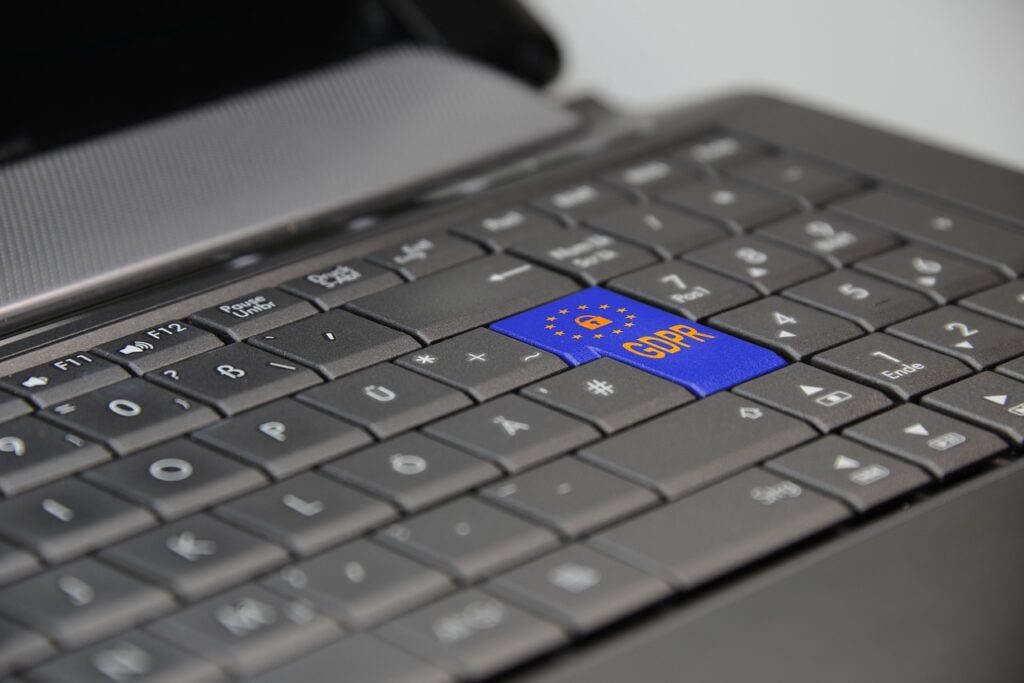Since the introduction of the EU & UK GDPR in 2018, the volume of the data we create, transfer and store has grown exponentially. Back then, global data consumption was 33 zettabytes or 33 billion terabytes. By the end of 2023, Statista predict that this will rise to 120 zettabytes, and by 2025, we will collectively generate a staggering 181 zettabytes of data.
As the volume rises, so does the value of the information that drives our businesses. In 2022, the digital economy was reported to be worth over $4 trillion globally. *
Today’s customers have far greater awareness of their data privacy rights; understandably, people want to know why their personal data is being collected, used by whom, and stored. More than two-thirds of consumers believe that their data privacy is a human right; ^ we are now in a privacy-first world, and the tech giants are keen to respond.
In April 2021, Apple released the App Tracking Transparency iPhone update, giving users choice regarding their data preferences. Within, 6 months 62% of users had opted out of data tracking, significantly impacting the data collection and analytics used for targeted advertising. That year, Facebook’s lucrative ad revenue plateaued for the first time. Moreover, by 2024, Google will phase out third-party cookies on their Chrome browser in response to customer demand. Consumers are highly aware of the extent their data is captured and increasingly believe that cookies invade their privacy.
With increasingly tighter controls presenting substantial data governance challenges, reducing the quantity of data available, businesses need to up their game to gain consumer trust and succeed in an era of rapid digitisation.

Do consumers trust companies with their data?
76% of CEOs say trust is critical to business competitiveness. + But what is consumer trust in business?
Customer trust relies heavily on an organisation’s ability to build an emotional connection through understanding, transparency, honesty and dependability. Gartner’s 2019 Brand Trust survey states that businesses with dependability as the cornerstone of their brand strategy are three times more likely to win customer trust.
Despite the GDPR being the world’s largest and strictest data protection policy, it appears that consumers still aren’t convinced. In their 2022 survey, eCommerce search platform, Motive, revealed that 80% of UK consumers are concerned about how their data is used. ** Furthermore, the Gartner report states that 83% of consumers say they will not do business with brands they don’t trust.
Consumers continue to worry about being tracked, or their data captured and sold on to advertisers when accepting a website’s consent banner; despite the latter being unlawful under GDPR. **

How can you earn consumer trust?
In 2022, Adobe published the results of their Trust Report. The extensive global survey of over 12,000 consumers and 2,000 senior executives within 15 countries showed widespread agreement on what it takes to earn and retain consumer trust.
Gaining trust digitally is now of equal importance as the trust earned in person; yet it is harder to obtain, virtually. Businesses have their work cut out for them; it isn’t enough to rely on that long privacy policy hidden in the corporate website footer. With so much instant online activity, consumers need to receive data privacy messaging quickly and easily.
However, being aware of digital customer trends presents a significant opportunity for businesses.
See from the customer’s perspective.
Business leaders who place the needs of their customers ahead of the organisation’s own interest and profit will build greater brand loyalty in the long term.
Knowing what is important to your customers, what worries them and being able to show understanding about those concerns, forges human connection; in turn, this drives enquiries and sales. 76% of respondents in the Adobe Trust Report believed that it’s important for businesses to show empathy regarding customer frustrations.
Why do you need customer data?
A culture of transparency and open communication builds trust, corporate reputation and will encourage customers to share data.
Question what data you are collecting. If you’re collecting more than you need, you’re likely to be paying to store unnecessary data, as well as potentially swaying customer confidence.
Adobe reports that 73% of consumers question whether the data requested, actually benefits the customer, or simply the company asking. It never hurts to openly remind customers that they are in control of their personal information under UK data protection legislation.
Tell your customers exactly why you are requesting certain data, why you need it, and what you do to protect it to prevent any data security issues. For example, are you requesting information a third-party supplier needs to deliver the contract? And importantly, how do you ensure that collaborative partners remain compliant, too?
According to Accenture’s 2021 research report ‘How to build trust in a new digital world,’ almost three-quarters of customers will share more personal information if brands are transparent about how it’s used.

How do you safeguard customer data?
A similar percentage, 78%, are willing to hand over their information if its protection is prioritised. ^
Conversely, failure to uphold strong data governance principles will cause significant reputational damage. Two-thirds of consumers say they would stop purchasing from a company entirely if their data is used without permission or there is a data breach. *
Whilst you must protect company data to remain legally compliant, today’s customers seek more information and greater reassurance – how do you safeguard their data, specifically?
A huge number of organisations have fully or partially transitioned to cloud storage.
The cloud is widely regarded to be more secure than on-premises servers, with multiple layers of security making it more resilient. Moreover, encryption at file level or using advanced methods protects files in transit or in storage. Do you employ the zero trust model to secure your organisation’s network perimeter, wherever people are accessing it from?
Edge computing has also changed the way we handle and transmit data. By decentralising data management, processing data close to where it was created, only essential information is forwarded to the cloud. This decreases the attack surface, and therefore risk.
Secure data erasure.
Despite fines of up to £17.5 million for GDPR non-compliance, the Adobe report revealed that shockingly, only 41% of executives say that strong data privacy and data governance processes are among their top priorities. This does little to reassure customers that their personal data is safe.
Corporate responsibility for their customer data extends beyond the data’s use. A robust IT asset disposal policy will demonstrate your company’s commitment to secure IT asset disposal for your end-of-life IT assets.
To remain productive, organisations rarely replace devices when they are no longer serviceable, but years before. Whereas traditional data destruction services involve destroying redundant IT equipment, leading IT asset disposal services use advanced, secure data erasure software. This leaves the device intact so it can be reused, refurbished, resold, donated or recycled. The software provides a tamper-proof certificate for each individual asset. This ITAD Chain of Custody provides essential proof that you have adhered to the GDPR data destruction requirements.
The circular approach adopted by sustainable IT asset disposition services will also build consumer confidence. Authentic sustainability and ethical business practices are also increasingly important considerations when it comes to consumer choice; building further trust in your business.

When it comes to respecting customer data, trust is non-negotiable. It can appear a difficult emotion to quantify, but its impact can be immeasurable when it comes to your business goals.
Numerous consumer trend surveys report near-universal findings and increasingly concerned customers are no longer so quick to hand over their information – the information that our data-driven businesses need to succeed in an increasingly digital world.
Data privacy must be a top priority and our organisations must practice what they preach.
In a fast-paced digital world, customers want to be fully informed without being met with a long, arduous privacy statement. Organisations that actively demonstrate empathy for their customer’s data privacy concerns and respond by delivering a culture of transparency, will experience greater consumer confidence.
By regularly communicating what information is needed and why, how it is processed, used, transferred, stored and crucially, securely erased, you will not only build but maintain consumer trust. Your loyal customers will naturally become consumer brand advocates who help to grow your business; as such, the influence trust has on your bottom line has never been greater.
*Adobe, ^ HubSpot State of U.S Consumer Trends 2023, +Accenture, **CEO Digital,
As a Gold Blancco data erasure software ITAD partner, tier1 guarantees your legal GDPR compliance, preventing any future data governance issues, whilst helping you to build customer trust in your data privacy processes.
Ask us about our fully circular, sustainable data erasure services or our 5-star refurbished device online store. Chat with our friendly team on 0161 777 1000 (Manchester), 01621 484380 (Maldon) or visit www.tier1.com
Resources.
HubSpot, Statista, Indicative, Google, LinkedIn, Bidnamic, Apple, CNBC, CEO Digital, Internet Retailing, Adobe, Accenture, Gartner, Tech Target, CMS Wire, Cloudfare, CSW Solutions,



